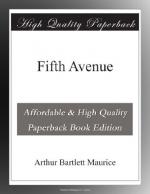“I say, Hurrah for Jackson, and so I am willing to say at all times when he does his duty. The only difference between the thorough-going Jackson man and me is, that I will not ‘hurrah’ for him right or wrong. And I think that Jackson’s election may save the Union.”
If he disliked Jackson on account of his policies, he seemed to dislike journalists regardless of their political creeds. To his eyes they were a pestilential crew. Here is the first glimpse of Bryant, the great William Cullen Bryant, who as a mere boy had penned the beautiful “Thanatopsis.” It is of the date of April 20, 1831. “While I was shaving this morning at eight o’clock, I witnessed from the front window an encounter in the street nearly opposite, between William C. Bryant and William L. Stone, the former one of the editors of the Evening Post, and the latter the editor of the Commercial Advertiser. The former commenced the attack by striking Stone over the head with a cow-skin; after a few blows the men closed, and the whip was wrested away from Bryant and carried off by Stone.” Here and there are flung expressions of admiration for Bryant’s verse, but the tone is of one speaking of the cleverness of a trained lizard. Thirteen years intervened between the first and the last Bryant entry. In February, 1844, Nicholas Biddle, the great financier, died. Something that Bryant wrote roused Hone’s wrath. Here is his comment of February 28: “Bryant, the editor of the Evening Post, in an article of his day, virulent and malignant as are usually the streams which flow from that polluted source, says that Mr. Biddle ’died at his country-seat, where he passed the last of his days in elegant retirement, which, if justice had taken place, would have been spent in the penitentiary.’ This is the first instance I have known of the vampire of party-spirit seizing the lifeless body of its victim before its interment, and exhibiting its bloody claws to the view of mourning relatives and sympathizing friends. How such a black-hearted misanthrope as Bryant should possess an imagination teeming with beautiful poetical images astonishes me; one would as soon expect to extract drops of honey from the fangs of the rattlesnake.”




